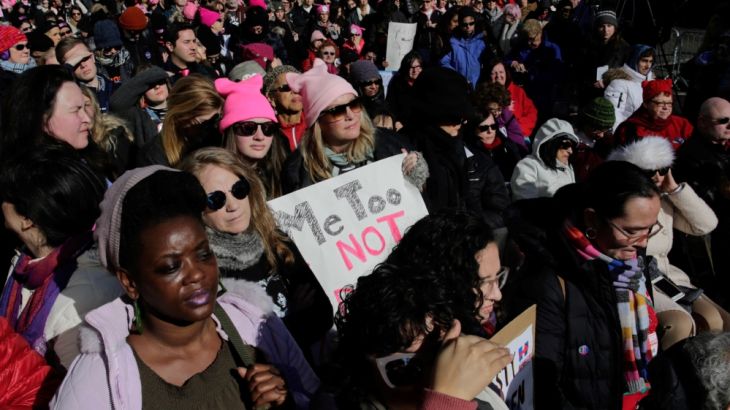Women’s March protests: Thousands rally against Trump
On the anniversary of Donald Trump’s inauguration, organisers hope to encourage women to get more involved in politics.

Thousands have taken part in women’s marches across the US on the one-year anniversary of Donald Trump‘s inauguration, in a bid to generate more female candidates running for office as well as to protest against the US president’s policies.
Under the name Power to the Polls, the rallies on Saturday were hailed as the beginning of a new era in female political activism, with organisers hoping to encourage more women to get involved in politics at the local and national level. More marches worldwide are planned for Sunday.
Keep reading
list of 4 itemsSix takeaways from first day of Trump’s New York hush money criminal trial
Day 1 of Donald Trump’s first criminal trial
What is Donald Trump’s ‘hush money’ trial all about?
“What you’re seeing one year into the Trump presidency is a growing sense that women don’t have a seat at the table,” Al Jazeera’s Rosiland Jordan, reporting from a march in Washington, DC, said.
“The goal for many of these protesters today is to get women, particularly women of colour, involved in politics. That does not mean just register to vote, but also be active in politics, so running for school board or even US Congress.
“The idea [behind the organisers’ action] is that it is not enough for people to show they are angry or frustrated with the Trump administration’s policies. The only way they are going to see the policies that reflect their desires is for them to get involved in the politically process itself.”
One of the protesters, Ashley Valentine, thinks 2018 is going to be a big year for the movement.
“We’re starting to pave the ground for real change to happen with the elections coming up, with women being more empowered to speak out against sexual violence and sexual misconduct and equal pay – all of these issues,” she said.
“And you have a lot of black women who are starting to take action and change the way things are working in this country.”
Thousands of people also attended marches in Cleveland; Richmond, Virginia; Philadelphia; New York; Austin, Texas; and elsewhere.
The rallies took place exactly one year after Trump took office, and one day before the anniversary of the Women’s March, a large-scale protest around the world for human rights.
Those rallies were a response to statements Trump had made before his inauguration which the protesters regarded as being against women’s rights, discriminatory and offensive.
![Participants focused on a number of issues, including the gender pay gap [Courtesy of Diana Limongi]](/wp-content/uploads/2018/01/2aad98bb761b49b68ba375cc1a51bfb9_18.jpeg)
Jordan said turnout at Saturday’s protests was a lot lower compared with last year, when millions of people had rallied in cities around the US.
Toni Adderley from Washington, DC attended both rallies, and she agreed that this year attendance was lower.
“It’s smaller [than last year], but it’s still powerful, especially to be in front of the White House and know he’s in there. Last year, he was aware, but they kept him shielded, so you know today he’s watching.
“I feel women are more empowered at this point, running for offices – maybe some women who never would have thought about running for public office or political office, so I feel women are more empowered.”
However, the march also attracted new participants. Nyema Batson, an 18-year-old student from Dallas, did not attend last year’s march, but felt she needed to take part this time around.
“I felt really inspired by all of the women around me and I wanted a chance to show what I really represent,” she told Al Jazeera.
“I came today because I want to stand up for women and I think we all deserve a platform to speak our voices, especially with who is in the White House right now.”
Participants did not just focus on women’s participation in politics, but also focused on issues such as sexual harassment, gender pay gap and lack of access to health care.
“All of these problems, including even bigger issues like environmental issues, racism, sexism, religious bigotry – all these issues have been talked about during today’s rallies,” said Al Jazeera’s Jordan.
Saturday’s protests also coincided with the day the US government went into a shutdown after members of Congress failed to reach an agreement on the divisive issue of immigration and government spending.
![During 2017, women's rights were talked-about globally [Courtesy of Diana Limongi]](/wp-content/uploads/2018/01/a82a02fb29dd4f7f8482f5d043452b1f_18.jpeg)
More protests against the Trump government are expected to take place on Sunday.
During 2017, women’s rights became one of the most talked-about social issues globally.
The global #MeToo movement has been used by millions of women worldwide to highlight and protest against endemic sexual harassment.
It was triggered by the scandal involving Harvey Weinstein, a Hollywood producer accused of rape, sexual harassment and assault by more than two dozen women, including actresses.
In a response to those allegations, many other women came forward to talk about their experiences with abuse.
![More protests against Trump are expected to take place on Sunday [Courtesy of Diana Limongi]](/wp-content/uploads/2018/01/cddfdc0fd66148298ac8d8ebb6f0cf35_18.jpeg)
Additional reporting by Elizabeth Walsh @elizgwalsh